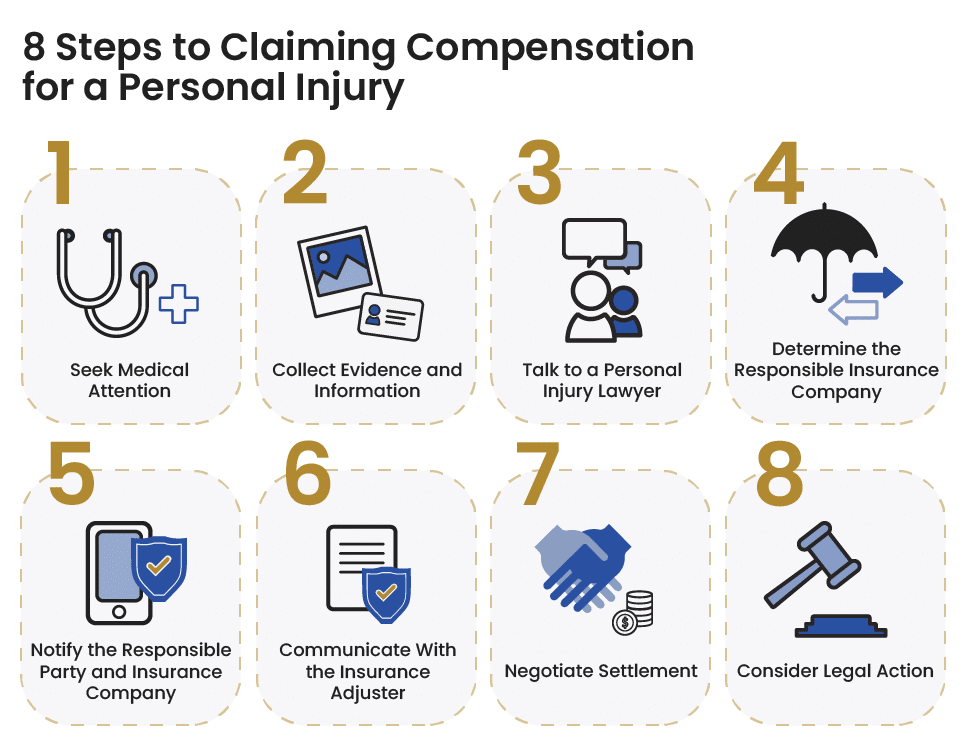Personal Injury Damages & Lawsuit Compensation
Category: Personal Injury
Article by Tuley Law staff

Imagine slipping on a wet floor or getting into a car accident. Both minor and major incidents fall under the umbrella of personal injury. But how will you pay for your medical treatment or medicine after these types of situations—especially if you weren’t at fault?
From a legal perspective, “personal injury” includes any accidents that one party can blame on another—from slipping on a wet floor to a fatal car crash. Various compensation types address this array of potential accidents.
The benefits you receive will depend on your specific situation. Hiring an Indiana personal injury lawyer to help you could significantly increase the benefits you recover from your lawsuit.
Types of Personal Injury Compensation
There are multiple categories of personal injury compensation. The primary types of personal injury damages are compensatory and punitive.
- Compensatory Damages: To make the injured party “whole” again by compensating for losses or damages.
- Punitive Damages: To deter the offender and others from similar harmful actions in the future rather than to compensate the injured party.
Benefits of Compensatory Damages
You can further break down compensatory damages into economic and non-economic damages.
- Economic damages are quantifiable financial losses.
- Non-economic damages are not easily quantifiable because they are subjective.
Economic Damages: Quantifiable Financial Losses
Economic damages, also called special compensatory damages, cover all quantifiable financial losses. Here’s an overview:
| Types of Damage | Description |
|---|---|
| Medical Expenses | Covers past and future medical costs, including treatment, appointments, rehabilitation, medicine, hospital stays, home care, and more. |
| Lost Wages | Compensates for income missed due to injury. |
| Loss of Ability to Earn Wages | Covers future earning capacity. |
| Expenses for Property Damage | Include repair or replacement of property like a vehicle, house, possession, etc. |
| Loss of Irreplaceable items | Some items may not be replaceable or fixable. If your personal injury has caused you to lose a unique possession, such as a family photo or heirloom, you may be able to recover additional compensation beyond the price of the initial item. |
Non-Economic Damages: Subjective, Not Easily Quantified Losses
Non-economic damages, also called general damages, are costs you can’t easily quantify. While some expenses are numerical values with receipts or debts, non-economic damages must be agreed upon subjectively.
Calculating general damages can be difficult and often involves frequent negotiations between the claimant’s team and the insurance company. These damages aim to compensate for the expenses and offer additional benefits for the pain or trauma the accident caused.
| Type of Damage | Description |
|---|---|
| Physical Pain and Suffering | Any constant discomfort or physical pain that lasts long-term. |
| Physical Impairment or Disfigurement | Compensation for social and professional challenges due to disfigurement or impairment. |
| Trauma Compensation | Compensation for trauma and emotional distress is meant to help the victim continue moving forward or even seek treatment for their issues. |
| Lower Quality of Life | Awarded if life enjoyment is significantly reduced. |
| Loss of Consortium | Occurs when a spouse or partner can no longer provide the same level of companionship as they could before the personal injury. |
Wrongful death damages are paid if the victim dies due to personal injury. They include medical costs before death, burial and funeral costs, anguish of surviving family, loss of contribution from income, and loss of consortium. But wrongful death damages are dictated by statute. Those statutes provide for what can be recovered under what circumstances.
Punitive Damages
Punitive damages differ from compensatory damages; they aim not to compensate the victim but to punish the responsible party. The overarching goal is to deter similar negligent or harmful behavior in the future.
When Are They Awarded?
Courts typically award punitive damages in cases involving:
- Gross negligence
- Malicious actions
- Criminal acts
Example Scenario
Consider a scenario where a large company deliberately ignores safety regulations to cut costs. If an individual is hurt as a result, the company may initially only face small compensatory damages.
- Financial Incentive: If the total of these smaller payments is less than the savings gained by ignoring safety measures, the company might find it financially beneficial to continue this risky behavior.
- Role of Punitive Damages: Punitive damages can dramatically increase the financial penalty, making it financially unjustifiable for the company to ignore safety regulations.
The likelihood of receiving punitive damages increases when dealing with powerful organizations that may believe they can evade the law. Awarding punitive damages in these cases sets a precedent. It encourages other businesses to operate ethically and within the bounds of the law.
How to Claim Compensation for Personal Injury
Claiming personal injury compensation can be complex, involving conversations with insurance companies and negotiations. By following these steps and considering hiring an Evansville personal injury lawyer, you may be able to navigate the process more effectively and help to ensure that you receive the full and fair compensation you deserve.

1. Seek Immediate Medical Attention
Obtain prompt medical care for any injuries, and keep all medical records and expenses related to your treatment. Your health is the priority; these documents will be crucial evidence in your claim.
2. Collect Evidence and Information
Gather evidence from the accident scene, such as photos, witness statements, and police reports. Document the details of the incident, including the date, time, location, and any contributing factors.
Other documentation:
- Medical records and bills related to the injury
- Evidence of lost wages or other financial losses
- Any correspondence with insurance companies
3. Consult a Personal Injury Lawyer
Consider hiring an Evansville personal injury lawyer to represent your interests. A lawyer will investigate the case, negotiate with the insurance company, and ensure you receive fair compensation.
4. Determine the Responsible Insurance Company
Identify the insurance company of the party responsible for the injury. The company may be their auto insurance, homeowner’s insurance, or other liability insurance, depending on the nature of the accident.
5. Notify the Responsible Party and Insurance Company
Send the demand letter to the claims department of the responsible insurance company. It’s best to send it via certified mail and request a return receipt to have proof of delivery.
6. Communicate With the Insurance Adjuster
Once you file the claim, an insurance adjuster will likely contact you to discuss the claim. They may request additional information or clarification on specific points. Be careful in your communication and consider consulting an attorney, as the adjuster’s job is to minimize the payout.
7. Negotiate a Settlement
Monitor the status of your claim and follow up with the insurance company as needed. Be prepared to negotiate the settlement amount.
8. Consider Legal Action if Necessary
If the settlement is acceptable, you will sign a release and receive the agreed-upon funds. If you and the insurance company cannot reach a fair settlement, you may need to file a lawsuit and proceed to court. Your personal injury attorney can help you go through this process.
How Much Does a Personal Injury Attorney Cost?
When you pursue a personal injury claim, one of your first concerns may be the cost of legal representation. The good news is that hiring a personal injury attorney at Tuley Law doesn’t have to be a financial burden because we operate on a fee-contingent basis.
Fee-Contingent Basis Explained
On a fee-contingent basis, the attorney’s fees depend directly on the outcome of your case. In other words, our payment is contingent on winning your case or achieving a satisfactory settlement.
Here’s how it works:
- No Upfront Fees: You won’t be required to pay any fees or retainers upfront. The fee-contingent payment structure makes legal representation more accessible to those who might not have the funds readily available.
- Payment After Success: You only pay if we successfully recover your compensation
- Percentage of Recovery: Tuley Law’s fee is typically a predetermined percentage of the total recovery. No hidden fees; we clearly outline the percentage in our retainer agreement.
Personal Injury FAQs
What is my case worth?
Let’s answer most people’s biggest question, “What’s my personal injury case worth?
Unfortunately, there isn’t a simple answer.
No two cases are the same. The value of your settlement depends on a variety of factors. The severity of your injuries, who the responsible party is, and even damage caps on personal injury cases can affect the benefits you will ultimately receive.
How long do I have to file a personal injury claim in Indiana?
In Indiana, the statute of limitations for most personal injury claims is two years from the date of the injury. However, exceptions or specific circumstances may alter this time frame. It’s advisable to consult with an attorney to understand the deadlines applicable to your case.
Do I need a lawyer to file a personal injury claim?
While you can file a personal injury claim independently, having an experienced personal injury lawyer can significantly enhance your chances of success. A lawyer can navigate the legal complexities, negotiate with insurance companies, and advocate for your best interests.
What if the accident was partly my fault?
Indiana follows the comparative fault rule, meaning that you may still recover damages if you were partially at fault. Your percentage of fault may reduce your compensation. If they find you more than 50% at fault, you might not qualify for any compensation.
How long will it take to settle my personal injury claim?
The timeline for settling a personal injury claim can vary widely based on the case’s complexity, the parties’ willingness to negotiate, and other factors. Some cases may settle quickly, while others may take months or years.
Will my personal injury case go to court?
Many people resolve their personal injury claims through negotiation and settlement, but some go to court when they can’t reach a fair agreement. An experienced attorney can guide you through either process.
Why Legal Representation Matters | Tuley Can Help
Understanding the nuances of personal injury compensation is crucial for anyone facing a legal battle in this area. Knowing the difference between compensatory and punitive damages can significantly impact your case.
Partnering with the right lawyer can clarify these complexities and potentially change the outcome in your favor. Need help navigating the complexities of personal injury law? Let our expert attorneys handle your case while you focus on your recovery. Ready to take the next step? Fill out the contact form to reach one of our Evansville personal injury lawyers for a consultation on your case.
Have questions about your case?
Contact us